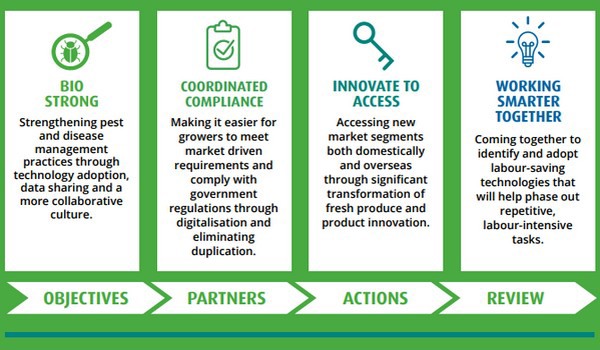The peak industry body for Queensland horticulture, Growcom Australia, has unveiled the 10-year roadmap for the Queensland fresh produce sector with the launch of its strategic plan this week, Future Fields.
Growcom Acting Chief Executive Officer Richard Shannon says the sector not only feeds a large part of the nation but, through direct on-farm employment puts food on the table for up to 25,000 Queensland workers and their families. Horticulture is the state's second-biggest agriculture sector, behind beef, and the gross value of production is $3 billion, with around 3,500 businesses engaged in the sector. With more than 100 types of fruit, vegetables, and nuts grown across the state, it supplies one-third of Australia's fruit and one-fifth of its vegetables, and in addition, $879 million worth of fresh produce exports come from Queensland.
Future Fields sets out an ambitious vision for where the Queensland fresh produce sector and supply chain wants to be at the end of the 2032-33 financial year. Following an extensive grassroots engagement and consultation process, four fields of focus were chosen: Innovate to Access, Working Smarter, Bio Strong, and Coordinated Compliance.
 Photo: Angus Ferrier, Chair of Future Field Advisory Committee; Belinda Frentz, Growcom Chair; and Director-General of Queensland DAF, Bob Gee (source: Growcom Australia).
Photo: Angus Ferrier, Chair of Future Field Advisory Committee; Belinda Frentz, Growcom Chair; and Director-General of Queensland DAF, Bob Gee (source: Growcom Australia).
The first involves reaching new markets through innovation in food processing, packaging, and logistics. The report points out that there is enormous potential to unlock greater returns by engaging in consumer-led innovation, leading to new products, markets, and value chains. It added that the industry needs to be more broadly focused as a fresh produce supply chain and be more of an integral part of the wider food industry. An emerging opportunity is making greater use of the whole crop to unlock value from the many parts of plants that are not edible. Not only will consumers benefit from their tastes being better met, but the more markets and value chains there are for fresh produce, the better grower returns will be overall.
"We are the lifeblood of many rural communities, creating over $3 billion in value at the farm gate last year," Mr. Shannon said. "Recently, COVID-19 has raised challenges and caused significant disruption to our sector, as have natural disasters and pest and disease incursions of national significance. We can expect these types of disruptions to continue, but they will also bring with them new opportunities."
Another field involves building skills to adopt and apply the new technologies that will reduce reliance on low-skilled and labor-intensive roles. Future Fields found that the fresh produce sector is highly reliant on a large seasonal and temporary workforce, particularly for picking and packing, with insufficient systems to minimize these repetitive and laborious tasks - and often, individual businesses lack the capital and expertise required to make significant investments in new technology. An opportunity lies in improving knowledge sharing and trust between growers, as well as attracting skilled workers into the fresh produce sector will kick-start the ability to continue to innovate.
"Many of the big, intractable challenges we face as an industry are entirely within our power to address," Mr. Shannon said. "Accordingly, Future Fields is creating a space for collaboration that would not ordinarily exist and gives all with a stake in our industry the opportunity to contribute and take action to make a real difference. Growcom welcomes the State Government's enthusiastic support of Future Fields and looks forward to our ongoing, productive relationship with the Department of Agriculture and Fisheries (DAF)."
 Source: Future Fields report/Growcom Australia
Source: Future Fields report/Growcom Australia
The other two areas surround managing pests, diseases, and biosecurity risks using data intelligence and collaboration; and making it easier for growers to comply with government regulations and meet market-driven requirements through digitization and eliminating duplication.
"Seizing opportunities in each of these fields will prove instrumental if Queensland is to remain the preeminent state for horticultural production, supply chain innovation, and food processing," Mr. Shannon said.
The full Future Fields plan can be found at www.futurefields.info
 For more information
For more information
Richard Shannon
Growcom
Phone: +61 7 3620 3844
growcom@growcom.com.au
www.growcom.com.au
